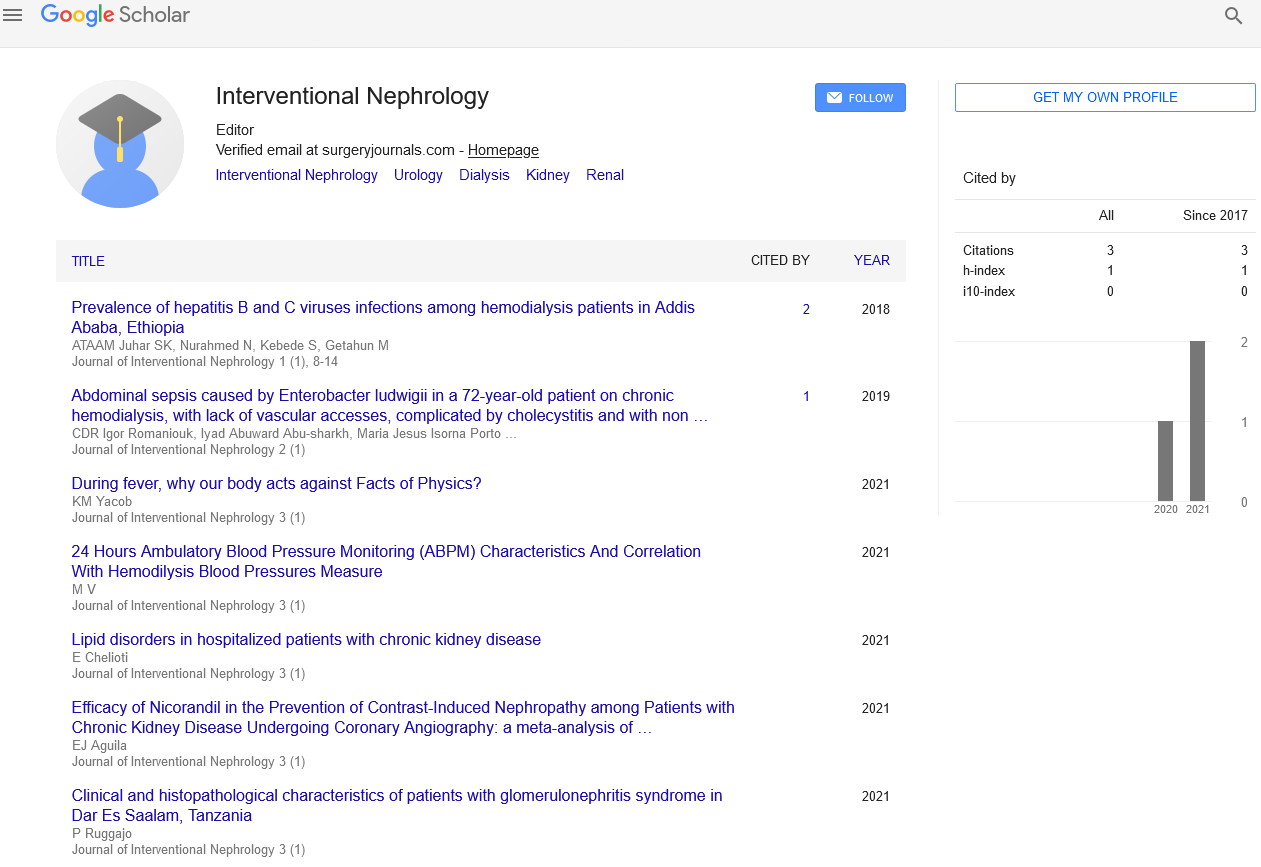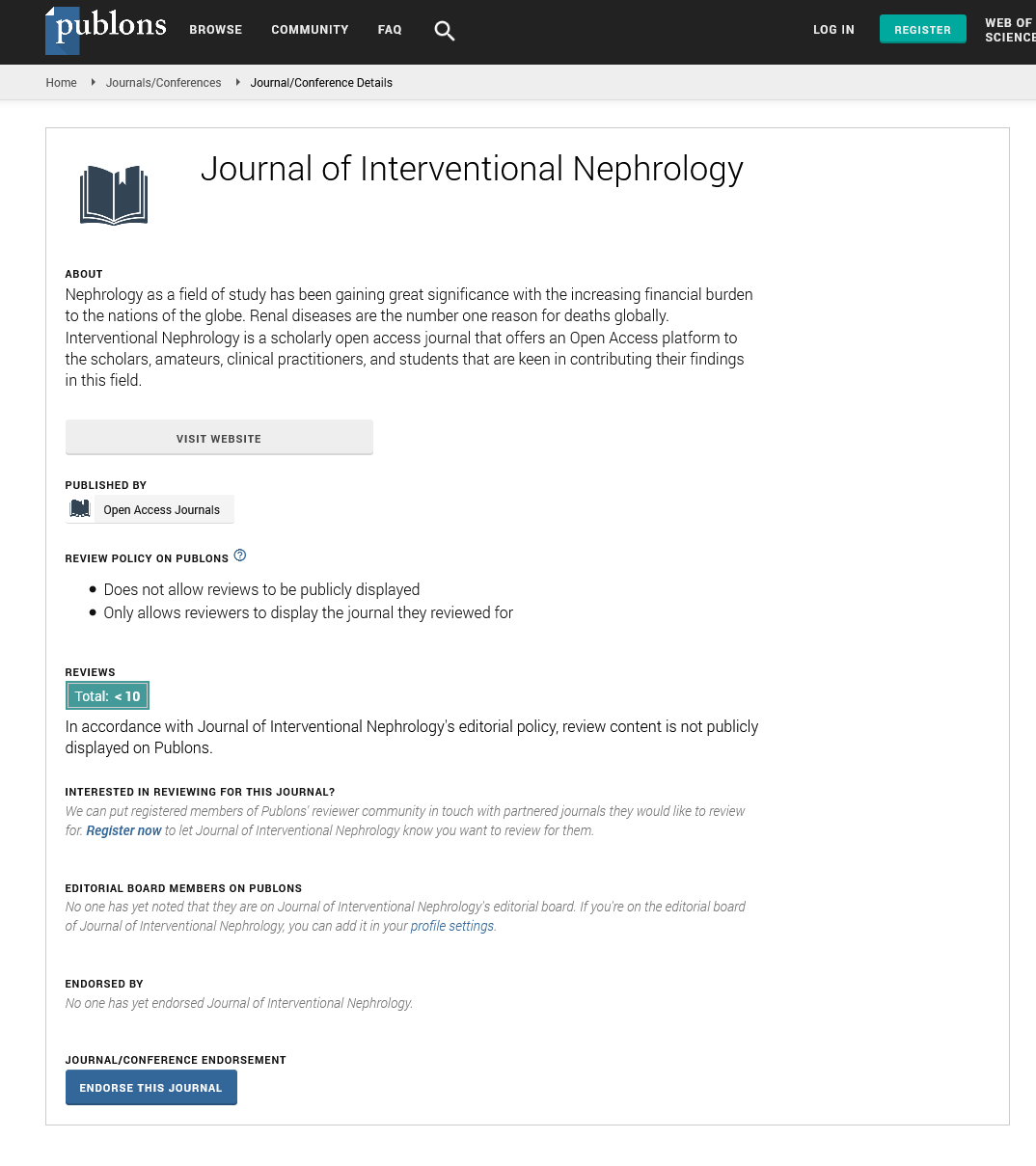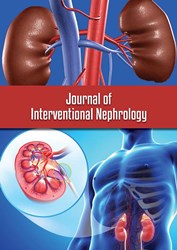Perspective - Journal of Interventional Nephrology (2024) Volume 7, Issue 1
Renal Cell Carcinoma: Unraveling the Intricacies of Kidney Cancer
- Corresponding Author:
- Sarah Mery
Department of Oncology, University Medical Center Cityville, Colombia
E-mail: Sarahmery1456wd@edu
Received: 23-Jan-2024, Manuscript No. OAIN-24-125673; Editor assigned: 25-Jan-2024, PreQC No. OAIN-24-125673 (PQ); Reviewed: 08-Feb-2024, QC No. OAIN-24-125673; Revised: 15-Feb-2024, Manuscript No. OAIN-24-125673 (R); Published: 23-Feb-2024, DOI: 10.47532/oain.2024.7(1).227-229
Abstract
Renal Cell Carcinoma (RCC), the most common form of kidney cancer, presents a formidable challenge in the realm of oncology. This comprehensive article delves into the multifaceted landscape of RCC, exploring its etiology, risk factors, clinical manifestations, diagnostic approaches, treatment modalities, and the imperative need for ongoing research and patient-centered care in the face of this intricate malignancy.
Keywords
Renal tubules • Hematuria • Obesity • Flank pain • Nephrectomy
Introduction
Defining RCC
Prevalence: RCC accounts for approximately 90% of all kidney cancers.
Origin: Arising from the renal tubules, the cancer often evolves asymptomatically.
Global impact
Incidence: A steady rise in RCC cases worldwide.
Challenges in early detection: Often diagnosed at an advanced stage due to subtle symptoms.
The complexity of RCC
Variability in presentation: Different subtypes of RCC manifest in diverse ways.
Metastatic potential: RCC is known for its propensity to spread to other organs.
Etiology and risk factors
Genetic predisposition: 1) Von Hippel-Lindau (VHL) syndrome: A hereditary condition increasing RCC risk. 2) Hereditary Leiomyomatosis and Renal Cell Cancer (HLRCC): Another genetic predisposition associated with aggressive forms of RCC.
Lifestyle and environmental factors
Cigarette smoking: A significant risk factor for RCC development.
Obesity: Increased body mass index linked to elevated RCC risk.
Occupational exposures: Certain chemicals and solvents implicated in RCC occurrence.
Age and gender
Prevalence in older adults: RCC is more common in individuals over the age of 60.
Gender disparities: Men are generally more susceptible to RCC than women.
Description
Clinical manifestations of RCC
Silent progression: 1) Asymptomatic early stages: RCC may advance without noticeable symptoms. 2) Incidental detection: Often diagnosed during imaging for unrelated issues.
Recognizable symptoms
Hematuria: Blood in urine, a common but not exclusive symptom.
Flank pain: Discomfort or pain in the side or back.
Palpable mass: A lump or mass in the abdomen often discovered during a physical examination.
Systemic implications
Paraneoplastic syndromes: RCC may produce hormones leading to diverse symptoms.
Metastatic spread: Common sites include the lungs, bones, and brain.
Diagnostic approaches and screening strategies
Imaging studies: 1) CT scan and MRI: Visualizing the kidney and identifying tumors. 2) Ultrasound: Non-invasive imaging for initial assessment. 3) Renal angiography: A more invasive procedure to examine blood vessels in the kidney.
Biopsy and histopathology
Needle biopsy: Extracting a sample for microscopic examination.
Histological subtypes: Clear cell, papillary, chromophobe, and other subtypes with distinct characteristics.
Genetic testing
Identifying hereditary factors: Genetic testing for syndromes associated with RCC.
Precision medicine approaches: Tailoring treatments based on genetic profiles.
Management and treatment modalities
Surgery as the primary approach: 1) Nephrectomy: Surgical removal of the affected kidney. 2) Partial nephrectomy: Preserving part of the kidney when possible.
Targeted therapies
Tyrosine kinase inhibitors: Blocking pathways involved in cancer growth.
Immune checkpoint inhibitors: Enhancing the body’s immune response against cancer cells.
Radiation therapy and immunotherapy
Adjuvant therapies: Used in conjunction with surgery to eliminate remaining cancer cells.
Combination approaches: Utilizing multiple treatment modalities for enhanced efficacy.
Challenges in RCC management
Advanced stage diagnosis: 1) Limited early symptoms: RCC often reaches an advanced stage before detection. 2) Screening challenges: Lack of routine screening methods for asymptomatic individuals.
Resistance to therapies
Resistance to targeted therapies: Challenges in overcoming the development of resistance.
Immunotherapy challenges: Not all patients respond favorably to immunotherapeutic approaches.
Importance of patient support
Psychosocial impact: Addressing the emotional toll of a cancer diagnosis.
Supportive care services: Integrating psychological and palliative care into RCC management.
Research and innovations in RCC Care
Advancements in imaging technologies: 1) Liquid biopsies: Non-invasive methods for monitoring disease progression. 2) Novel imaging agents: Enhancing precision in tumor visualization.
Emerging therapies
Genomic studies: Identifying biomarkers for targeted therapies.
Combination therapies: Synergistic approaches for improved treatment outcomes.
Patient-centric approaches
Shared decision-making: Involving patients in treatment decisions.
Clinical trials: Investigating innovative therapies and approaches.
Patient-centric care and quality of life
Multi-disciplinary collaboration: 1) Team approach: Collaboration among oncologists, surgeons, radiologists, and supportive care specialists. 2) Patient navigation programs: Assisting patients in understanding and navigating their treatment journey.
Supportive services
Palliative care: Addressing symptom management, psychosocial support, and end-of-life considerations.
Patient advocacy groups: Providing resources and a sense of community for individuals with RCC.
Survivorship programs
Post-treatment support: Monitoring for recurrence and managing post-treatment effects.
Quality of life assessments: Incorporating patient-reported outcomes into care plans.
Conclusion
Renal cell carcinoma, with its intricate subtypes and varied presentations, demands a nuanced and evolving approach to diagnosis and management. From early detection strategies and surgical interventions to targeted therapies and ongoing research, the landscape of RCC care is dynamic. As the medical community navigates the complexities of kidney cancer, a collective commitment to awareness, patient-centered care, and continuous research will shape a future where the impact of RCC is minimized, and the quality of life for individuals facing this formidable malignancy is optimized. Through advances in precision medicine, innovative therapies, and a holistic approach to patient well-being, the journey toward effective RCC care continues, offering hope and improved outcomes for those affected by this intricate and challenging cancer.


